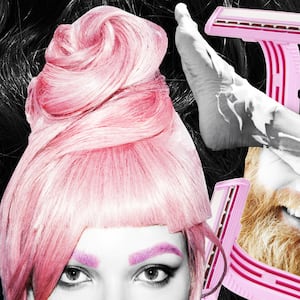As the new socially distant reality drags on, hair has become a major topic of conversation on Zoom dates and phone calls. Videos of at-home buzz cuts are inescapable on social media. Celebrities from Ricky Martin to Elle Fanning have dyed their hair pink. Anderson Cooper revealed on air that he accidentally gave himself a bald spot. But not everyone’s feeling the DIY spirit.
As cabin fever—and split ends—reach an apex, barbers have begun to offer house calls for those unwilling to pick up scissors themselves. Last month, The Washington Post described a growing “black market of hairstylists” ready to “risk it all” with such visits, but those who spoke to The Daily Beast are not trying to hide their services.
Many have taken to advertise on Craigslist and Instagram, charging a bit more than usual for appointments. It helps them keep food on the table and rent paid as salons remain shuttered.
“As a professional barber [before coronavirus], I took the risk of getting diseases in my day-to-day work,” Sal Salzano, from Westchester County, said. “Obviously, who wouldn't be nervous in a time like this? But I could catch anything any day. It’s the profession I chose.”
Salzano says he began cutting again after isolating at home for three weeks. He keeps his visits to a 40-mile radius of his town, and “charges double” for the session.
“People say I’m not going to get customers because my price is too high, but I’m not trying to see the guy who wants to pay $20 for a haircut,” he said. “A guy who’s going to pay $60, $70 for a haircut obviously cares about his appearance, cares about himself.”
Pre-pandemic, Salzano would see around 12 clients a day. Now, he’s lucky to get “half that a week.”
“I don’t even consider this working,” he admitted. “It’s money that I spend on food and gas for this week.”
The barber wanted to make clear he’s not running a large-scale shop where people gather. “[The state] doesn’t want to promote being social, but I don’t think they’re out here saying there’s a ban on haircuts,” Salzano said. He says he’s cut the hair of a few cops, a nurse, and a respiratory therapist.
Another New York barber, Richard Cacace, has also visited city hospitals for cuts. At the beginning of quarantine, Cacace said he felt “too afraid” to work. One of his private clients, a doctor at Mt. Sinai, encouraged him to make house-calls as long as the space was private, he washed his hands, had “very little interaction” with customers and worked behind them, instead of in front. He now wears a N95 mask and personal protective equipment for every visit.
“It’s not easy, to be honest,” Cacace said. “Am I putting myself at risk? Of course I am. I understand the hesitation and that people are paranoid.” One client told Cacace that he could only enter their apartment if he agreed to being sprayed with Lysol head-to-toe. He chose to leave instead.
Before agreeing to make a call, Cacace asks that only two people—the barber and the client—be present for a cut. “Last week I went to 86th Street, and there was a nanny and the housekeeper, plus five kids,” he said. “That was too much for me. When it’s one-on-one, and I’m covered and protected, I feel it’s OK.”
Along with the requisite mask, gloves, hand sanitizer, and tool cleaner, Cacace brings his own paper towels to place on surfaces and wipe counters down. “I don’t think there’s anything secret to what I’m doing,” he said. “I have to survive. The landlord still wants rent, and I still have bills to pay. What am I supposed to do? I don’t have boatloads of money. I can’t float myself for six months.”
He believes he’s taking the necessary precautions. “If I felt unsafe, I’d stop doing it,” Cacace said. “It’s not just about making money. What is the point of making tons of money and then winding up in the hospital?”
By his own estimate, Cacace has received “over 350” calls for appointments. He charges between $75 and $100 for a home visit, and $35 if a person is willing to come to his apartment. “I try to be fair,” he said. “I understand a lot of people are out of work. Sometimes they’ll text me, ‘Can you do $30? I just lost my job.’ I’ll take $30 if you’re honest with me.” He also visits hospitals and lowers the rate for essential workers.
“Hopefully, I get people out of bed,” he said. “I hope they really like it, like me, and want to keep doing it.”
Michael Cuthrell, a barber from Virginia, first spoke to his hometown paper The Winchester Star about his haircuts, which take place on porches, front lawns, and garages so he doesn’t have to be inside someone else's home.
Cuthrell told The Daily Beast he got the OK from his state’s Department of Professional and Occupational Regulation. The salon he usually works for, Eagan & Company, may be closed, but house-calls remain legal.
As the “sole provider” for his wife and children, including a 2-month-old newborn, Cuthrell feels a responsibility to keep a regular paycheck.
“I’ve been cutting hair for 10 years,” he said. “I never imagined that I was going to be told I wasn’t allowed to. This is my livelihood and business.”
When Eagen & Company closed for business, Cuthrell tried to get a job at a local distribution factory. That fell through. After a couple clients asked for appointments, he couldn’t resist getting back to work. His wife OK’d the decision, and now helps him with booking.
Cuthrell lugs around a chair, light, and briefcase full of tools for every visit, and he wears two masks, one on top of the other, for “safety.”
“It’s more than just a haircut,” he said. “It makes people feel so much better. I know a lot of people right now are shaving their heads, and I don’t discourage that, but it’s an emotional thing when you shave your head. To not have to go through that experience and rather just get a good haircut, hopefully that helps people stay strong and stay inside.”
One of Cuthrell’s favorite parts of the job is “seeing people who haven’t seen other people in weeks.”
“The kids are so excited to see someone, and the parents are so happy to have someone there,” he said. “There’s a normal-ness to this.”
Cuthrell used to visit the police station every two weeks to give cops cuts. The ritual continues, just in their garages now.
“That’s a profession that needs haircuts, and also doctors, but a lot of people are still working right now and need to stay maintained,” he said. “A friend who works at a gas station told me his boss was giving him a hard time about his hair looking the way it was. Just because all of this is happening doesn’t mean people don’t need to be looking fresh.”






